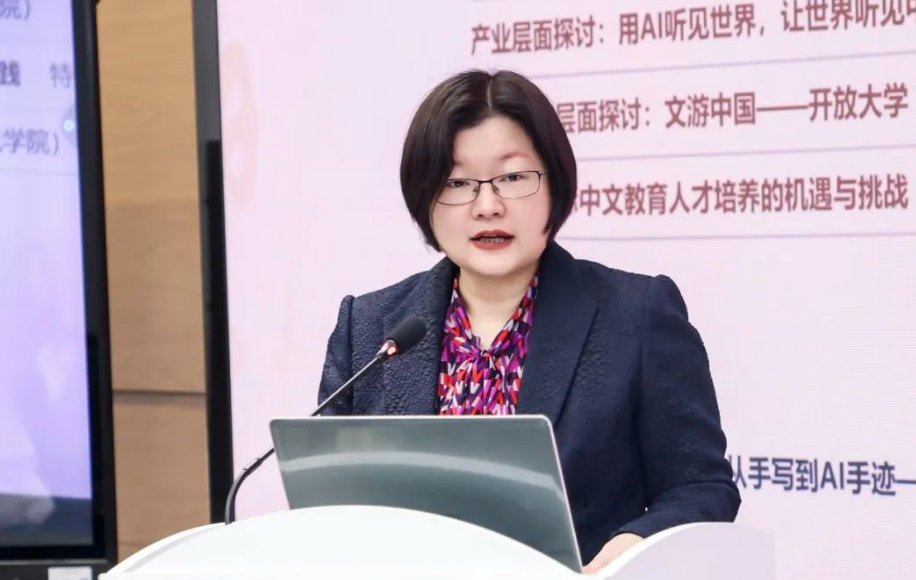 Beijing, 20 April 2025 - The Open University of China (OUC) hosted a special event titled “Chinese Wisdom Illuminates the World, Chinese Soul Builds Dreams” to celebrate the 16th United Nations Chinese Language Day.
Beijing, 20 April 2025 - The Open University of China (OUC) hosted a special event titled “Chinese Wisdom Illuminates the World, Chinese Soul Builds Dreams” to celebrate the 16th United Nations Chinese Language Day.
GE Siying, Deputy Secretary-General of the Secretariat of the National Commission of the People’s Republic of China for UNESCO; LIU Jianqing, Deputy Director-General of the Centre for Language Education and Cooperation (CLEC) of the Ministry of Education; and FAN Xianrui, Vice President of OUC, attended the event and delivered speeches. Faculty and staff representatives from OUC and students from the Experimental College specialising in fields such as artificial intelligence (AI) and calligraphy participated in the event, which included a roundtable forum and immersive interactive experiences.
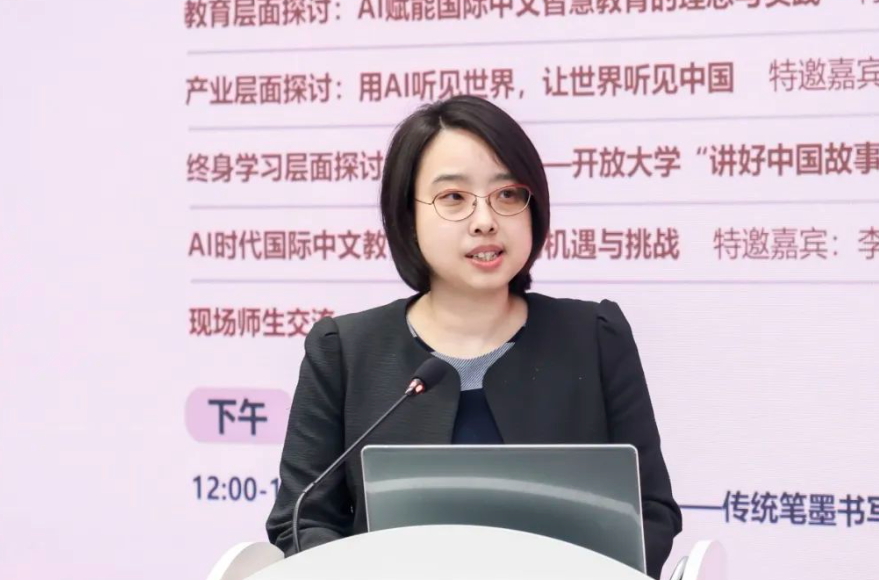
Speech by GE Siying
GE stated that since its establishment in 2010, the United Nations Chinese Language Day has grown into a global celebration for Chinese speakers and learners. “OUC has been leveraging digital-intelligence technologies to break down spatial and temporal barriers to Chinese language education, building “cloud bridges” for global learners. This initiative aligns with UNESCO’s mission to “promote educational equity and protect cultural diversity,” she said.
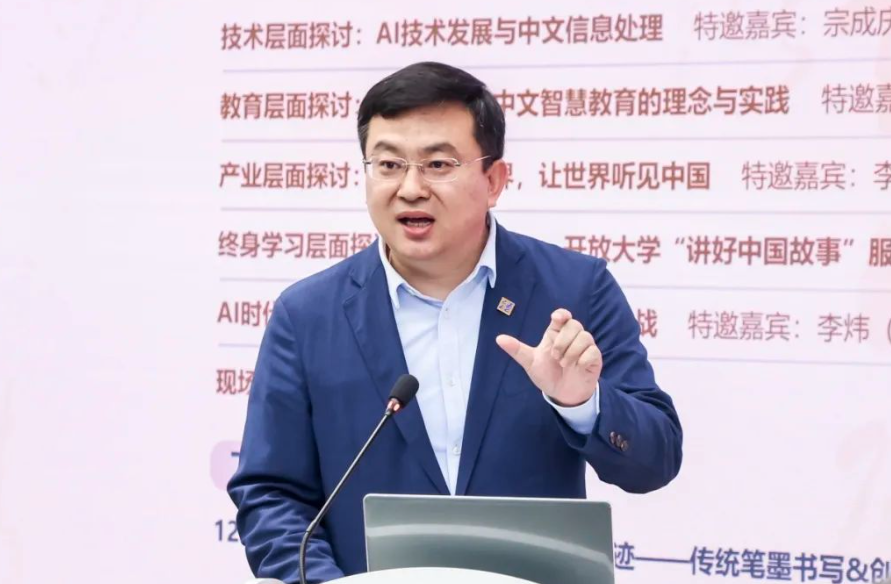
Speech by LIU Jianqing
LIU pointed out that Chinese is now taught in over 190 countries and regions, with 85 countries incorporating it into their national educational system. Approximately 200 million people outside China are learning Chinese. He emphasised that OUC integrates Chinese education with digital and intelligent technologies such as artificial intelligence, big data, and virtual reality (VR), empowering Chinese language learning with new vitality in the digital era.

Speech by FAN Xianrui
FAN highlighted that the Chinese language is not only a tool for communication but also a vessel of civilisation. AI technology offers endless possibilities for the inheritance and innovation of the Chinese language. OUC has long been committed to providing high-quality digital learning resources for global learners, while actively exploring the application of intelligent technologies in education, especially in Chinese language teaching. OUC has been aiming to promote the deep integration of Chinese language and technological innovation through a collaborative model of "technological innovation + cultural inheritance," contributing to the opening-up of Chinese education through both "bringing in" and "going global" initiatives.
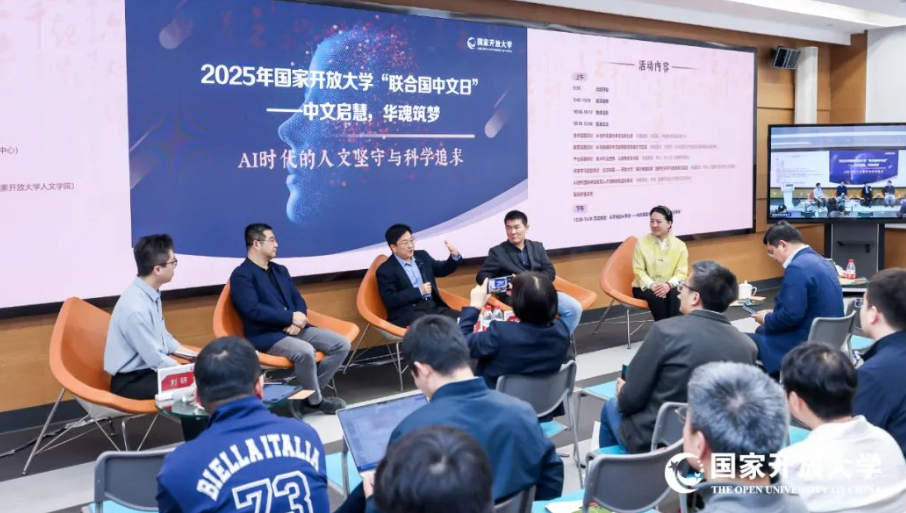
Roundtable Forum
Centred on the theme "Preserving Humanistic Values and Seeking Technological Advancement in the AI Era", the forum facilitated dynamic exchanges on multiple topics: AI technology development and Chinese information processing, concepts and practices of AI-empowered international Chinese smart education, practices of language intelligence technology in international Chinese education, the "Cultural China Tour" project, and OUC's innovative Chinese education practices. Participants engaged in robust discussions about digital transformation in Chinese language education and how to leverage technology to tell China's stories well.
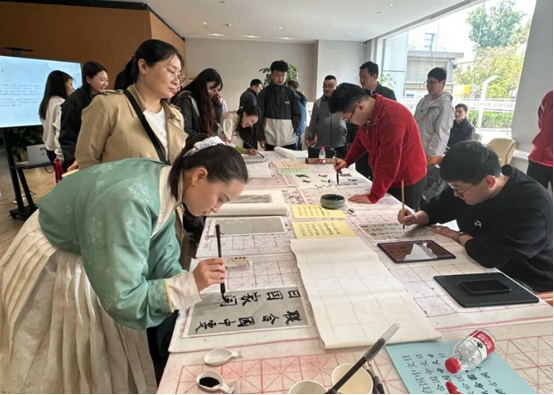
Students from the Experimental College demonstrated traditional Chinese characters with brush and ink.
The event's interactive activities innovatively blended traditional culture with modern technology. Attendees engaged in hands-on activities which showed the evolution of Chinese characters - from practising traditional calligraphy with brush and ink to creating personalised digital font packages using the "Zi Jia" and “My Font” apps. These activities vividly demonstrated how technology is breathing new life into China's linguistic heritage, merging ancient writing art with cutting-edge AI-powered technology.
About United Nations Chinese Language Day
The date for the United Nations Chinese day was selected from Guyu ("Rain of Millet"), which is the 6th of 24 solar terms in the traditional East Asian calendars, to pay tribute to Cangjie. Cangjie is a very important figure in ancient China, claimed to be an official historian of the Yellow Emperor and the inventor of Chinese characters. Legend has it that he had four eyes and four pupils, and that when he invented the characters, the deities and ghosts cried and the sky rained millet. From then on, Chinese people celebrate the day Guyu in honour of Cangjie. In the Gregorian calendar, it usually begins around April 20.
Chinese was established as an official language of the United Nations in 1946. However, in early years, Chinese was not commonly used in the work of the United Nations. The situation was improved after restoration of the lawful rights of the People's Republic of China in the United Nations in 1971. In 1973, the General Assembly included Chinese as a working language, which was followed by the Security Council in 1974. More and more UN offices and staff members work with Chinese language (the excerpt is reprinted from UN website https://www.un.org/zh/observances/chinese-language-day/english).
Contributed by College of International Education